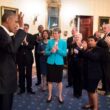MANY DETRACTORS of Barack Obama’s Nobel Peace Prize are cagey about the real reasons for their opposition, because they have spent years opposing the biggest issue for which the Norwegians made the award: nuclear disarmament. For decades, diehard Cold Warriors in the Pentagon, the Senate, and often the White House made it clear to the rest of the world that the U.S. was talking about nuclear disarmament for others, not for itself.
This year President Obama definitively changed the nation’s course—from a unilateral and belligerent policy that ultimately depended on the big nuclear stick, to a multilateral policy committed to nuclear disarmament. In Prague on April 5, within months of taking office, Obama declared that the United States would “seek the peace and security of a world without nuclear weapons.” If the U.S. media were not watching, Oslo was.
At the United Nations in September, nuclear issues loomed high on the horizon, not least because Obama was pushing them. He was the first U.S. president ever to preside over the U.N. Security Council and his chosen agenda was nuclear disarmament. Admittedly the resolution he proposed was heavy on principles and light on detail, but it showed just how important he considers the issue.
Disarmament breaks down into several categories. First, there is the nuclear Non-Proliferation Treaty, (NPT) which has been signed by most countries except India, Pakistan, and Israel, and which has been “unsigned” by North Korea.
Second is the Comprehensive Test Ban Treaty, which has effectively stopped all nuclear testing since 1996—apart from test detonations by those non-signatories to the NPT.
Third is the Fissile Material Cut-off Treaty, which would ban the processing of the refined materials necessary for bomb production. Obama’s unanimously adopted resolution at the Security Council includes a commitment to work for the ban, informed by fears that if the stuff is around, at some point Al Qaeda or its emulators will be able to use it.
The core bargain of non-proliferation is that the five nuclear states grandfathered into the agreement—Britain, China, France, Russia and the United States—would themselves move to disarmament. That process has been stalled, but Obama now seems to be moving it forward. The United States and Russia now have most of the world’s nuclear weapons, and Obama has already moved to renew and expand the Strategic Arms Reduction Treaty with Moscow. His reconsideration of the provocative, expensive (and almost certainly useless) anti-missile program in Eastern Europe has already gone a long way to ease Russian suspicions.
These are all solid first steps towards persuading a suspicious world community that the U.S. is finally serious about these issues. Yet it is the “I”s that really have it. Obama must persuade the Iranians to cooperate with the IAEA (International Atomic Energy Agency), the Indians to step back, and Israel to come out of the closet regarding its nuclear arsenal.
Obama is trying hard with Iran, and is slowly winning some concessions. He inherited from the Bush administration an agreement with India, which flouts the NPT by allowing exchanges of technology despite India’s nuclear testing and boasting about its weaponry. The concessions were provided, in part, in return for India’s help at the IAEA in referring Iran to the U.N. Security Council.
That step, and the bargain it required, was essential for the Bush administration, because Iran has been faithful to the letter of the NPT, even if one may entertain reasonable doubts about its adherence to the treaty’s spirit. Yet by giving India a pass on the NPT, Bush weakened the leverage that might persuade New Delhi to step back. Obama has not renounced the agreement with India, but his administration has shown reluctance to implement it effectively.
There have been no such concessions with Pakistan, although its strategic position with Afghanistan makes it very difficult to squeeze. And of course, throughout the Middle East there is concern that a group of fundamentalist religious figures might have their fingers on the nuclear trigger.
The U.S. avoids addressing Israel’s nuclear arsenal. Indeed, it has been suggested that after Hillary Clinton boldly included Israel in U.S. plans for disarmament, the Obama administration agreed to drop all mention of it in return for concessions from Netanyahu on peace talks. The rest of the world will watch this for a litmus test of American sincerity.
Even so, President Obama has undoubtedly changed the nation’s course, which the Nobel committee recognized. To make any progress on the new path, one of the president’s first steps must be ratification of the Comprehensive Test Ban Treaty, which Republicans in the Senate refused to vote for last time it came up, in 1999, partly because it would have been a success for the Clinton administration and partly because of the Republican senators’ faith-based objection to any form of disarmament. The U.S. has not tested nuclear weapons since 1992 and by all accounts has no plans to do so, but reality and most Republicans parted company some time ago. So Obama will have to deploy some serious pressure in order to get the two-thirds vote needed for ratification. Nuclear testing is not popular, so public pressure would help him build that majority in the Senate.
Ian Williams is a senior policy analyst for Foreign Policy in Focus.






0 Comments